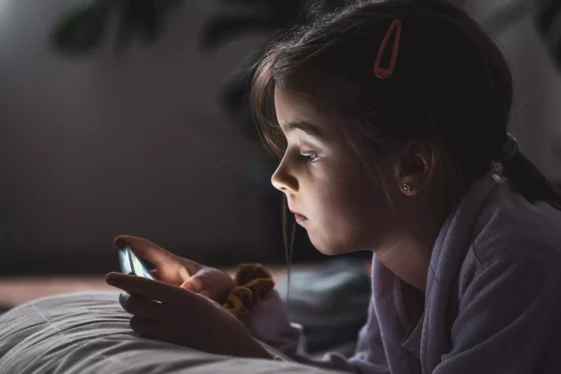
The Impact of Screen Time on mental wellbeing is one of the common concerns of modern life. Excessive screen use can affect sleep, mood, attention and stress levels. This blog explains the problem, everyday signs to watch for, practical Ayurvedic-friendly and evidence-based steps to reduce harm, tips for parents and workers, and when to get personalised help.
The problem
The core Impact of Screen Time problem is that screens change behaviour and biology: they shift sleep timing, boost late-day alertness, fragment attention and can increase social comparison or loneliness. Over weeks and months these changes may increase anxiety, low mood, irritability and cognitive fatigue. From an Ayurvedic view, excessive screen use aggravates Vata (restlessness) and Rajas (overactivity), weakens Agni (digestion/metabolism) and reduces Ojas (mental resilience).
How screen time affects mental wellbeing — quick overview
- Sleep disruption: Blue light and late exposure delay melatonin, making it hard to sleep. Poor sleep worsens mood and memory.
- Mood & anxiety: Constant notifications and social media comparisons can raise stress and anxiety.
- Attention & productivity: Frequent switching between apps trains a scattered attention style and reduces deep focus.
- Social connection: Online contact can supplement relationships, but shallow interactions may increase loneliness for some people.
- Addictive patterns: Habit loops (likes, alerts) produce compulsion-like behaviour and difficulty stopping.
- Physical knock-on effects: Poor posture, eye strain and reduced movement indirectly harm mental wellbeing.
Signs your screen time is harming mental health
- Difficulty falling asleep or waking tired despite “enough” hours.
- Persistent irritability after heavy phone/computer use.
- Trouble concentrating on single tasks; constant tab-switching.
- Social withdrawal or mood dips after scrolling social feeds.
- Using screens to avoid feelings (boredom, sadness) and finding it hard to stop.

Practical steps to reduce harmful Impact of Screen Time (daily habits)
Use small, consistent changes — they add up.
- Set a phone-free wind-down (60 minutes before bed).
Put devices away, read, practice slow breathwork or light stretching. - Use a single device for work where possible.
Close extra tabs and use app blockers for focused sessions (Pomodoro: 25–50 min work / 5–10 min break). - Apply the 20-20-20 rule for eyes.
Every 20 minutes, look 20 feet away for 20 seconds. - Schedule “no-screen” blocks.
Morning (first 30–60 minutes) and family meal times are great anchors. - Adjust display settings.
Use night mode / blue-light filters after sunset and reduce screen brightness. - Create friction for scrolling.
Move apps off the home screen, use grayscale mode, or uninstall nonessential apps. - Replace small habits with short restorative rituals.
Swap the first scroll of the day with warm water, tongue scraping, light movement or 5 minutes of pranayama (Anulom Vilom). - Prioritise movement & sunlight.
Regular walks and morning sunlight reset circadian rhythm and improve mood. - Mindful social media use.
Follow supportive accounts, set time limits and curate feeds deliberately. - Keep work boundaries.
Turn off non-urgent notifications after work hours; define clear start/stop times.
Special tips — parents & children
- Set family screen rules (no devices at meals, device-free bedrooms).
- Use co-viewing for young children — engage with content together.
- Replace passive screen time with active play for kids (outdoor play, crafts).
- Model behaviour: children copy adult screen habits.
For remote workers — keep balance
- Use scheduled breaks and standing or movement reminders.
- Create a dedicated workspace and leave it at the end of the day.
- Use batch-processing (email blocks) to reduce constant checking.
Ayurvedic micro-practices that help with screen overload
- Abhyanga (short self-oil massage) in evenings calms Vata and reduces restlessness.
- Pranayama (Bhramari, Anulom Vilom) for 5–10 minutes reduces anxiety and restores focus.
- Warm water on waking + light breakfast to stabilise digestion and energy rhythm.
These support recovery from the mental strain of heavy screen use.
When screen time effects need professional help
See a clinician if you have persistent insomnia, severe anxiety, depression, suicidal thoughts, or marked decline in daily functioning. If you want an integrative plan (sleep hygiene, psychotherapy, Ayurvedic support), consult a professional.
For personalised Ayurvedic-informed care and stepwise plans to manage the Impact of Screen Time on your mental wellbeing — including breathing routines, herbal support and lifestyle prescriptions — get a consultation from Vedic Upchar:
👉 https://vedicupchar.com/doctor-consultation
Quick 7-day starter plan to reduce harmful screen impact
- Day 1: Track current screen time; set a 30-minute morning no-screen window.
- Day 2: Add a 60-minute evening wind-down (no screens).
- Day 3: Install night mode and try grayscale after 8 pm.
- Day 4: Do 5 min morning pranayama instead of first scroll.
- Day 5: Create two 45-minute focused work blocks with breaks.
- Day 6: Family device-free dinner.
- Day 7: Evaluate mood and sleep; adjust rules for week 2.